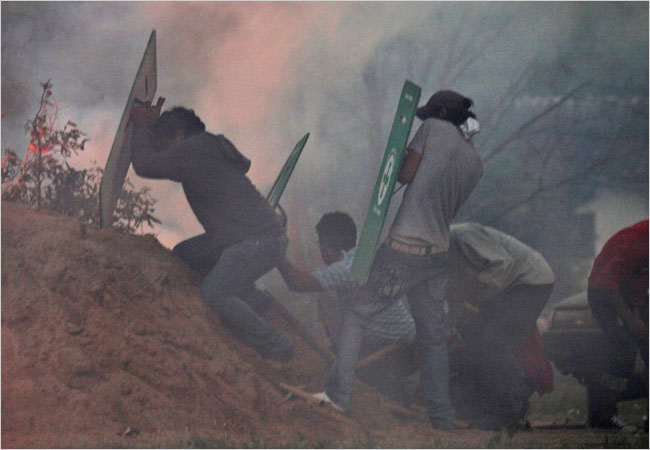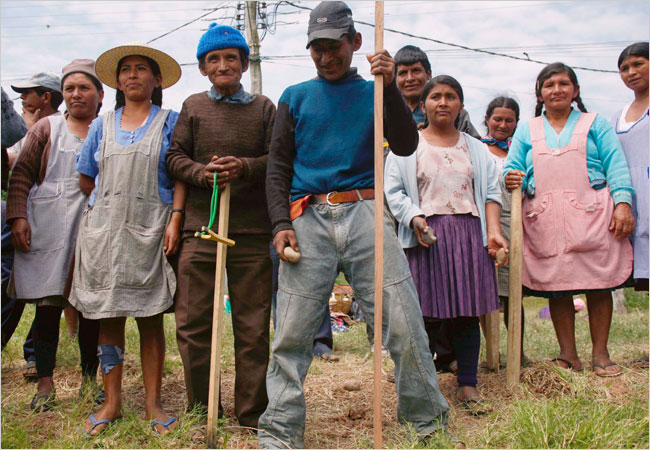 (above) Bolivian farmers who support President Evo Morales fought Saturday against those who called for more autonomy from his government. (Photo: Bruno Domingos/Reuters)
(above) Bolivian farmers who support President Evo Morales fought Saturday against those who called for more autonomy from his government. (Photo: Bruno Domingos/Reuters)
A Crisis Highlights Divisions in Bolivia
September 14, 2008 - New York Times
By SIMON ROMERO
Published: September 14, 2008
LA PAZ, Bolivia — President Evo Morales is facing the most acute crisis of his presidency as deaths from violence in rebellious northern Bolivia increased to almost 30 over the weekend. Supporters of Mr. Morales said Sunday that the death toll could rise with dozens of people caught up in the violence and still unaccounted for.
Relative calm returned to the northern department of Pando on Sunday after Mr. Morales declared martial law there and troops dispatched from La Paz seized the airport and other facilities in Cobija, the departmental capital. But the threat of unrest persisted in other parts of Bolivia, and political leaders in the tropical lowlands bordering on Brazil said they would resume protests if killings in Pando continued.
(below) Supporters of the president stood guard at a road blockade on Sunday about 30 miles from Santa Cruz in eastern Bolivia. (Photo: Dado Galdieri/Associated Press)

Mr. Morales said that the violence was a massacre carried out partly by “Peruvian and Brazilian mercenaries” hired by the governor of Pando, Leopoldo Fernández, who went into hiding to avoid arrest. In comments to a local radio station, Mr. Fernández denied that accusation, asserting that the deaths resulted from clashes between antigovernment protesters and the president’s supporters.
On Sunday, Juan Ramón Quintana, a top aide to Mr. Morales, told a local radio station that Mr. Fernández had been arrested, The Associated Press reported.
The violence points to renewed tension over Mr. Morales’s attempts to redistribute petroleum royalties and to overhaul the Constitution to speed land reform and create a separate legal system for Bolivia’s indigenous majority. Most of Bolivia’s natural gas and food is produced in the eastern lowlands, and those departmental governments have chafed at the president’s proposals.
The polarization of the country intensified in August after Mr. Morales won 67 percent approval in a nationwide referendum over his policies, reflecting intense support for him in the rural highlands and in large cities like La Paz and Cochabamba. But governors in the eastern departments who urge greater political and economic autonomy from Mr. Morales’s government were reaffirmed in their posts with similar margins.
“You have a conflict between a constitutional national power and a de facto regional power that can only be resolved by constitutional force,” said Heinz Dieterich, a Mexico-based political analyst who writes widely on leftist movements in Latin America. “If Evo does not use the judiciary and the military, there is no way he can govern.”
Loyalty within the Bolivian military itself has been called into question, however. Gen. Luis Trigo, the top commander of the armed forces, bristled at an assertion last week by President Hugo Chávez of Venezuela, Mr. Morales’s top ally, that Venezuela could intervene militarily in Bolivia if Mr. Morales were toppled.
On Saturday, Mr. Chávez taunted the Bolivian military further, saying it seemed to be on strike while instability reigned in some areas. Mr. Chávez said he hoped a meeting of South American leaders convened for Monday in Santiago, the capital of Chile, could alleviate the tension.
The crisis also illustrates waning American influence in Bolivia. Last week Mr. Morales expelled Philip S. Goldberg, the American ambassador, accusing him of supporting groups seeking greater political autonomy in the lowlands. In a show of solidarity, Venezuela expelled the American ambassador in Caracas, and Honduras declined to approve the arriving American ambassador.
In Bolivia, the expulsion order came after supporters of Mr. Morales, a former coca grower, accused the American Embassy of fomenting rebellion through antidrug projects financed by the United States Agency for International Development, or Usaid, and cooperative intelligence operations established by the previous government.
“The accusations that were made against me, against the embassy, against Usaid, against my country and against my people, are completely false and unjustified,” Mr. Goldberg said Sunday before boarding a plane for the United States.
Bolivia’s neighbors are increasingly looking to Brazil to mediate between Mr. Morales and his regional opponents, even though leaders in the eastern lowlands are irked by the Brazilian president’s support for Mr. Morales. Shipments of Bolivian natural gas to Brazil were interrupted last week after saboteurs caused a pipeline explosion in the southern department of Tarija.
Santa Cruz, a lowland department that is Bolivia’s most prosperous region, was a focus of the protests last week. The most intense violence, however, flared in Pando, poor and sparsely populated in the Amazonian lowlands bordering Brazil.
Security forces sealed off air access to Pando after declaring the state of siege. Residents and travelers who managed to get out reported sporadic gunfire on the streets of Cobija even after martial law was imposed.
On Sunday, little definite was known about the killings that took place in recent days about 20 miles outside Cobija. Defense Minister Walker San Miguel said on state television that the government was working with Brazil to capture armed assailants seeking to flee across Pando’s border into the Brazilian Amazon.
The unfolding crisis reflects a polarized Bolivia with vastly different hopes and interests.
Mr. Morales’s efforts to enfranchise the long-neglected Aymara and Quechua Indians who populate the highlands depend on his ability to wrest control of petroleum royalties from the lowlands. But that more richly endowed region has shifted its attention away from the government centralized in La Paz and eastward to Brazil’s turbocharged capitalism as an inspiration for development.
In Santa Cruz, the tension appeared to ease on Sunday. Antigovernment road blockades were lifted and cars circulated freely in a city that had been immobilized for days by shortages of gasoline and diesel.
A more volatile picture emerged from Pando of the fractious Bolivia that Mr. Morales is struggling to hold together. In Filadelfia, another community rocked by violence — the town hall was burned down over the weekend — three students were reported killed.
Adriana Jurado, whose son, Wilson, was among the dead, pleaded with authorities to view his body. “I want to see my son,” a crying Ms. Jurado said in comments broadcast on the radio. Addressing Pando’s missing governor, she asked, “Leopoldo Fernández, where is my son?”